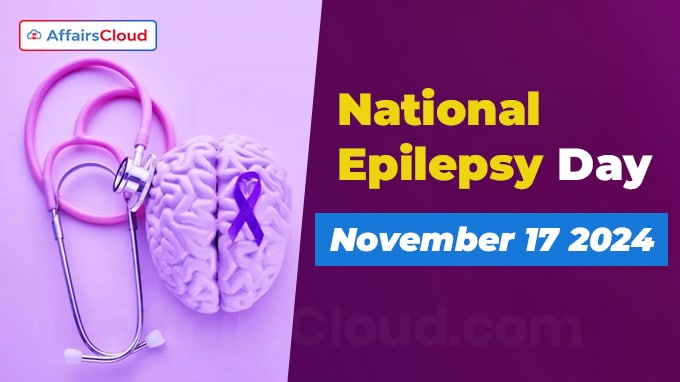 National Epilepsy Day(NED) is annually observed across India on 17th November to spread awareness about Epilepsy, a neurological disorder characterized by recurrent seizures. The NED also highlights epilepsy’s impact on individuals, families and communities.
National Epilepsy Day(NED) is annually observed across India on 17th November to spread awareness about Epilepsy, a neurological disorder characterized by recurrent seizures. The NED also highlights epilepsy’s impact on individuals, families and communities.
- The day offers a platform to eliminate the myths and misconceptions regarding epilepsy.
Symbol:
i.The color purple is associated with epilepsy because it’s the color of Lavender, the international flower of epilepsy.
ii.The purple ribbon is a symbol of epilepsy awareness.
Background:
i.The General Body meeting of the Indian Epilepsy Association (IEA) held on 17th December 1990 in Indore, Madhya Pradesh (MP), the 17th November of every year was declared as the National Epilepsy Day(NED).
ii.The observance of National Epilepsy Day was proposed by the Indian physician couple – Dr Eddie Bharucha and Dr Piloo Bharucha.
Epilepsy:
i.Epilepsy is a chronic Non-Communicable Disease (NCD) and a neurological condition that causes abnormal electrical activity in the brain, leading to seizures.
ii.Epilepsy can affect people of all ages, races, and ethnicities. It’s one of the most common disorders of the nervous system
iii.The causes of epilepsy, includes brain damage, tumors, strokes, and an imbalance of neurotransmitters.
iv.Anti-seizure medicines can help many people with epilepsy become seizure-free.
Key Points:
i.Around 50 million people across the globe have epilepsy, This is one of the most common neurological diseases globally.
ii.Nearly 80% of people with epilepsy live in low- and middle-income countries.
iii.It is estimated that up to 70% of people living with epilepsy could live seizure-free if properly diagnosed and treated.
WHO Response:
i.The 1st global report on epilepsy “Epilepsy: A public health imperative” was produced in 2019 by the World Health Organization (WHO) and key partners. The report highlighted the available evidence on the burden of epilepsy and the public health response required at global, regional and national levels.
ii.The Intersectoral global action plan on epilepsy and other neurological disorders 2022–2031 was adopted by the 75th World Health Assembly (WHA). It acknowledges that epilepsy and other neurological disorders share preventive, pharmacological, and psychosocial approaches that can be useful starting points for bolstering and expediting services and support for these conditions.
Other Related Observance:
i.International Epilepsy Day is annually observed across the globe on 2nd Monday of February to promote awareness of epilepsy.
- International Epilepsy Day 2024 was observed on 12th February 2024.




